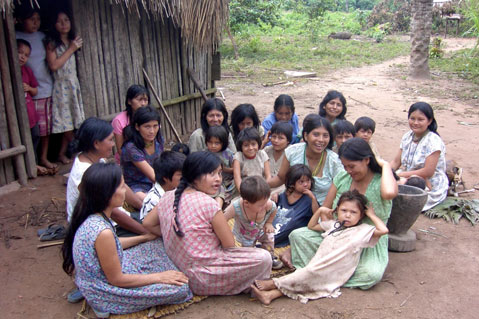UCSB Researchers Study Link Between Parasites and Fertility
Anthropologists Investigate How Intestinal Worms Affect Female Fertility in Bolivia

UCSB graduate student Melanie Martin noticed something striking during her time in the field with the Tsimane people of Bolivia. Almost immediately after she and her husband decided they wanted to start a family, Martin was able to conceive — a phenomenon she attributed to the parasites she was studying.
As a relatively isolated population, the indigenous Tsimane (pronounced chee-MAH-nay) have been an active point of scientific study for their anomalous health patterns. “We look at what’s different and what’s similar between the Tsimane and Western populations,” UCSB anthropologist Michael Gurven told The New York Times. Gurven co-directs the Tsimane Health and Life History Project, a field site dedicated to biomedical and anthropological research established in 2001. The project has led to a number of scientific findings, such as establishing cardiovascular disease as a modern development. Other Tsimane scientific research focuses on DNA, lifespan, nutrition, disease, and fertility.

In an effort to establish a link between parasites and female fertility, Martin, Gurven, UCSB postdoctoral anthropology scholar Benjamin Trumble, and UCSB Assistant Professor of Anthropology Aaron Blackwell began to analyze 9 years worth of longitudinal data they had collected. The results of their study were published last week in Science, a renowned academic journal.
“We found that different species of helminths — a family of parasitic intestinal worms — could have either positive or negative effects on the timing of a Tsimane woman’s next pregnancy,” lead author Blackwell told The UCSB Current. “Hookworm infection tended to increase the length of the intervals between births, and that was consistent across all ages. But younger women infected with roundworm had shorter birth intervals.” Quantitative analysis established that hookworm-infected women would have three fewer children than uninfected women, and roundworm-infected women would have two additional children.
Although helminth infections are associated with a variety of ailments, from anemia to digestive conditions, those who are lightly infected endure no symptoms. Helminth infections are common in developing countries where improper waste disposal fosters their growth and spread. According to a World Health Organization report, an estimated 2 billion people worldwide are infected with helminths. Blackwell’s team noted that 70 percent of the Tsimane women have a helminth infection whose manifestations include immunology alterations. Essentially, the team’s recent findings reveal the extended effects of intestinal worms on the human body and its functions.



